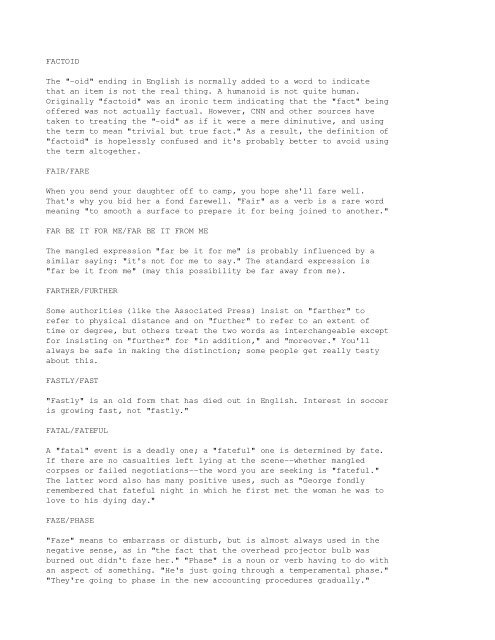Common_Errors_in_English_usage
Common_Errors_in_English_usage
Common_Errors_in_English_usage
Create successful ePaper yourself
Turn your PDF publications into a flip-book with our unique Google optimized e-Paper software.
FACTOID<br />
The "oid" end<strong>in</strong>g <strong>in</strong> <strong>English</strong> is normally added to a word to <strong>in</strong>dicate<br />
that an item is not the real th<strong>in</strong>g. A humanoid is not quite human.<br />
Orig<strong>in</strong>ally "factoid" was an ironic term <strong>in</strong>dicat<strong>in</strong>g that the "fact" be<strong>in</strong>g<br />
offered was not actually factual. However, CNN and other sources have<br />
taken to treat<strong>in</strong>g the "oid" as if it were a mere dim<strong>in</strong>utive, and us<strong>in</strong>g<br />
the term to mean "trivial but true fact." As a result, the def<strong>in</strong>ition of<br />
"factoid" is hopelessly confused and it's probably better to avoid us<strong>in</strong>g<br />
the term altogether.<br />
FAIR/FARE<br />
When you send your daughter off to camp, you hope she'll fare well.<br />
That's why you bid her a fond farewell. "Fair" as a verb is a rare word<br />
mean<strong>in</strong>g "to smooth a surface to prepare it for be<strong>in</strong>g jo<strong>in</strong>ed to another."<br />
FAR BE IT FOR ME/FAR BE IT FROM ME<br />
The mangled expression "far be it for me" is probably <strong>in</strong>fluenced by a<br />
similar say<strong>in</strong>g: "it's not for me to say." The standard expression is<br />
"far be it from me" (may this possibility be far away from me).<br />
FARTHER/FURTHER<br />
Some authorities (like the Associated Press) <strong>in</strong>sist on "farther" to<br />
refer to physical distance and on "further" to refer to an extent of<br />
time or degree, but others treat the two words as <strong>in</strong>terchangeable except<br />
for <strong>in</strong>sist<strong>in</strong>g on "further" for "<strong>in</strong> addition," and "moreover." You'll<br />
always be safe <strong>in</strong> mak<strong>in</strong>g the dist<strong>in</strong>ction; some people get really testy<br />
about this.<br />
FASTLY/FAST<br />
"Fastly" is an old form that has died out <strong>in</strong> <strong>English</strong>. Interest <strong>in</strong> soccer<br />
is grow<strong>in</strong>g fast, not "fastly."<br />
FATAL/FATEFUL<br />
A "fatal" event is a deadly one; a "fateful" one is determ<strong>in</strong>ed by fate.<br />
If there are no casualties left ly<strong>in</strong>g at the scenewhether mangled<br />
corpses or failed negotiationsthe word you are seek<strong>in</strong>g is "fateful."<br />
The latter word also has many positive uses, such as "George fondly<br />
remembered that fateful night <strong>in</strong> which he first met the woman he was to<br />
love to his dy<strong>in</strong>g day."<br />
FAZE/PHASE<br />
"Faze" means to embarrass or disturb, but is almost always used <strong>in</strong> the<br />
negative sense, as <strong>in</strong> "the fact that the overhead projector bulb was<br />
burned out didn't faze her." "Phase" is a noun or verb hav<strong>in</strong>g to do with<br />
an aspect of someth<strong>in</strong>g. "He's just go<strong>in</strong>g through a temperamental phase."<br />
"They're go<strong>in</strong>g to phase <strong>in</strong> the new account<strong>in</strong>g procedures gradually."





